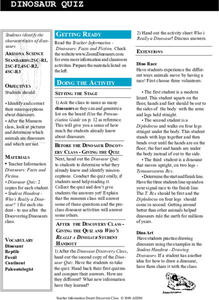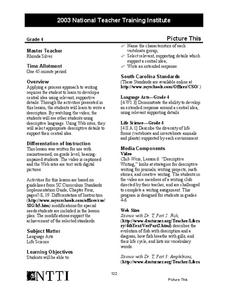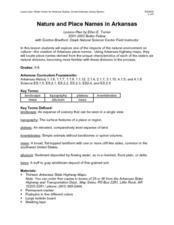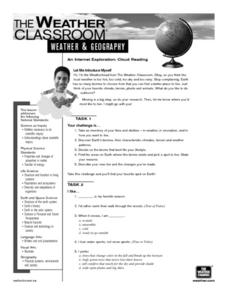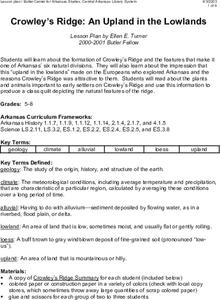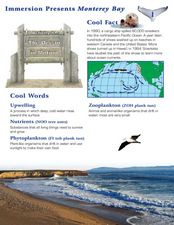Curated OER
Form and Observation
Use a familiar song and adorable baby animal pictures to teach youngsters about genetic variation. Begin by listening to "Twelve Variations on 'Ah vous dirai-je Maman,'" which you will need to find online (there are several versions...
Georgian Court University
Introduction to Marsh Ecology
Compare and contrast the characteristics of fresh and salt water marshes. After exploring the typical plants and animals found in each marsh type, participants use a set of flash cards to sort into fresh and salt water marsh life. Their...
Curated OER
Where It Comes From: All About Heredity
Characteristics are not only inherited, but can be acquired through interactions with the environment.
Star Wars in the Classroom
Star Wars Geography Unit
What kind of animals live on an ice planet like Hoth? How would the habitat on Tatooine allow different organisms to thrive? Connect social studies, science, and Star Wars in one engaging activity that focuses on the ecosystems of the...
Curated OER
Horse Character: Ceramics Lesson
Animals oftentimes elicit various characteristics which make them symbolic or representative of human feeling, action, or emotion. The class creates horse characters out of clay to show character action and symbolism. This is a great...
Desert Discoveries
Dinosaur Quiz
Young scientists explore the world of dinosaurs. They engage in a variety of activities designed to help correct misconceptions about dinosaurs, and which help them to determine which animals are dinosaurs and which are not. There is a...
Curated OER
Write a Description
Finding the central idea is the focus of this lesson. Middle schoolers write descriptions of different animals using details and descriptive language. They watch a video of kids using descriptive language, and then use showing language...
Curated OER
Tables
Can you read this table? Learners begin to comprehend data analysis through examining two simple tables and answering comprehension questions. The first gives characteristics about three animals in yes-or-no format (i.e. "eats insects,"...
ARKive
Adaptations for Movement
What animals are best suited for moving around a rainforest, or a desert? Design your own animal species based on a particular habitat, focusing on the characteristics it will need for optimal movement. Great as a group lesson or...
Curated OER
Nature and Place Names in Arkansas
Middle schoolers examine the way that many place names in Arkansas came to be. By looking at Arkansas highway maps, they find names that come from the characteristics of each of the state's six geographical divisions. This interesting...
Curated OER
Cloud Reading
Students identify the biomes of the Earth and their characteristics. They discuss their favorite seasons and the weather. They share their favorites with the class.
Curated OER
"Zebra" by Chaim Potok
Combine art and literature to teach greater themes and symbolic meaning. Using the plan outlined in this resource, expose your class to the story "Zebra" by Chaim Potok, conduct discussions about social issues and nicknames, and ask...
Curated OER
Crowley's Ridge: An Upland in the Lowlands
This clever lesson plan combines elements of geography, art, literature, and storytelling. Pupils take a close look at the six geographical regions of Arkansas, and pay close attention to Crowley's Ridge - which is one of the six. In...
Curated OER
Don't Call Me A Pig
First graders explore wildlife and habitats in the Arizona desert. Throughout a classroom discussion, 1st graders observe pictures of the desert and animals that live there. As they go on a nature walk around the school, students...
Curated OER
Monterey Bay
Students read background information about Monterey Bay, California, and conduct related experiments. In this ocean in motion lesson, students read information about the location, wildlife, and characteristics of Monterey Bay. They...
Rainforest Alliance
My Forest or the Rainforest?
The differences between tropical and temperate rainforests range from animals and flowers to climate and landscapes. Kindergarteners compare and contrast characteristics of their local forest to a tropical rainforest.
Reed Novel Studies
The Wind In The Willows: Novel Study
True friends stick together. In the case of The Wind In The Willows, the friends just happen to be a toad, mole, rat, and badger who team up to beat the weasels. The resource covers the first chapter of their raucous adventures. Scholars...
American Museum of Natural History
What is Marine Biology?
A marine environment covers the majority of the earth but is arguably the least understood. Teach young scientists about the characteristics of oceans and ocean species using an interactive online lesson. The in-person or remote learning...
American Museum of Natural History
Ocean Creature Feature
From coloring to hard protective shells, ocean creatures have adaptation features that help them survive. An eight-question online quiz highlights different ocean animals and their unique characteristics. The resource then offers pop-up...
American Museum of Natural History
What's This? Leeches
Who actually likes leeches? Meet a scientist that makes his living letting leeches feed on him. Pupils learn about the characteristics of leeches and different variations of the species. The lesson works as a remote learning resource or...
American Museum of Natural History
Wonderful World of Wasps
Shockingly, wasps sometimes challenge lions as the king of predators! Learners explore the life of a wasp in an interactive online lesson. They read about the characteristics of wasps and then complete activities to learn about their lives.
Curated OER
Wetland Metaphors
Students describe the characteristics of wetlands and identify their ecological functions. They inspect items and use them to create metaphors about wetlands.
Curated OER
Be the Poet
Middle schoolers work through a Haiku Organizer to determine the characteristics they use to write eight haiku poems on a theme that they choose. They design presentation folders of their completed work.
Curated OER
Pumpkin Time
Students visit a pumpkin farm and discuss the characteristics of a pumpkin and how they grow. They create a class story about the trip to the farm with each student supplying a sequence for the story.







